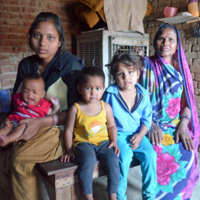
I don’t know exactly how many years I’ve been in Kathmandu, maybe 13… I ran away with my village friends. At that time I was not yet 15. My friends said it would be good. We could weave carpets, roam around, and enjoy ourselves in Kathmandu city. We would not have to work hard, like in the village, where we did household chores, farming, collection of fodder and firewood, and cleaning the cow shed.
How could Kathmandu really be as they described? The factory owners did not pay us for three years. Nor did they give us any clothes. Many of those who were working with me returned home. They did not let me go. In the carpet factory they first take you to the proprietor. They keep you to train you. For three months they do not pay any money. Only food is given in the morning and evening, that’s all. Even after I had learnt to weave carpets, the instructor took my salary. When I demanded it, he beat me.
For three years I didn’t go home. I didn’t even have 25 paisa. How to go from there? There was no one to ask on my behalf for the money I had earned. As they found I couldn’t speak out they dominated me, and I used to fall ill at times… “You’re always falling ill,” they scolded. And if they spent 300 rupees on medicine then they inflated that to 1,000 rupees and billed me accordingly. They used to say, “Your debt is more than what you get from working,” and they didn’t pay me anything. I left once but that woman brought me back and beat me. After getting a lot of beating I really bit her hand and she stopped. “I have taught you and you cannot go to another place,” she said.
Finally I managed to run away from that place with great difficulty. I went to Kalanki carpet factory and out of nowhere my elder sister’s father-in-law arrived. My relatives talked here and there, and married me off to a boy from Kavre district. It is in the hills. I had never seen that boy before… I knew him one week before the marriage. My husband used to weave carpet on the same loom. At that time I thought that boy might be good. He was young and I was also young.
At times I wonder why I came and started to learn weaving carpets. I used to get excited hearing about Kathmandu. As it was our capital, we really imagined it to be a beautiful place…When we first arrived, wherever you looked, lights were glittering. Wherever you looked, big, big buildings…gleaming motorcars. It was enjoyable… In the beginning, the idea was to earn some money in a year or two and go home… Now life is gone, it’s gone for nothing. Just problem after problem. I cannot sleep the whole night, thinking about it.
Narrative as told to the Panos Oral Testimony Programme, 2002, in Kathmandu, Nepal.








